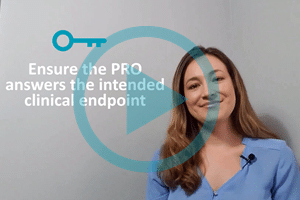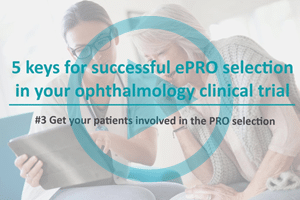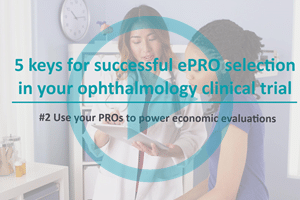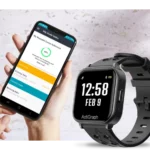PROs in ophthalmology trials can either be self-administered by the patient or the responses can be collected through an interview, administered by the investigator or site personnel. They both present advantages and drawbacks that can affect the responses provided by the patients.
Self- administered ePRO presents the following advantages:
- Prevents interview bias and avoids the need for additional training for interviewers.
- There is less coordination required, as patients may complete the questionnaires on their own time and do not require any specific appointment to be made. It allows for patient autonomy.
- For aspects that explore satisfaction or personal feelings, self-administration allows for more privacy compared to an interview setting.
PROs for patients participating in ophthalmic trials may necessitate an interview mode because of potential visibility limitations. If the population skews more elderly, there may be additional dexterity limitations or technology difficulties. However, there are limitations with using an interview mode that include:
- The Interview bias that may impact the validity of the data. The presence of an interviewer can be distracting to respondents, or interviewers can vary in their ability to appear or sound neutral, listen, aid recall, and to record responses. Careful training and monitoring of interviewers can minimize this, but completely removing this bias is difficult.
- As interviews involve social interaction with another person, it can lead to respondents taking social norms into account when responding, resulting in potential social desirability bias (the desire of respondents to present themselves in the best possible light). This can result in the over-reporting of desirable behaviors, and under-reporting of undesirable behaviors.
- Interview requires standardization of the interview process and additional training for the interviewer may be required, which will need to be anticipated in the study timelines and budget.
Interviews do have some advantages over self-administration such as interviewers can control the order of the questions administered, while patients may change the order and adjust their response accordingly in self-administration. Also, an interviewer can re-direct respondents back to the topic of relevance if they stray off it, probe to elicit relevant information, and utilize a range of techniques to prompt memory, while in the self-administration setting the respondent alone has to judge whether the information they have recalled is relevant to the question, and how best to respond.
Selecting the method of questionnaire administration should take into consideration what the preferred method would be for the patient, to encourage the most accurate responses, and how to reduce potential biasing effects. This must happen early in the questionnaire selection process, as it may have important implications in the research methodology and on the validity of the results of research.
Celeste Sage, Clinical Project Manager @Kayentis
Estelle Haenel, Medical Director @Kayentis
Discover more on successful ePRO selection in your ophthalmology clinical trial:
Follow us on LinkedIn to stay up-to-date on our latest videos:


















